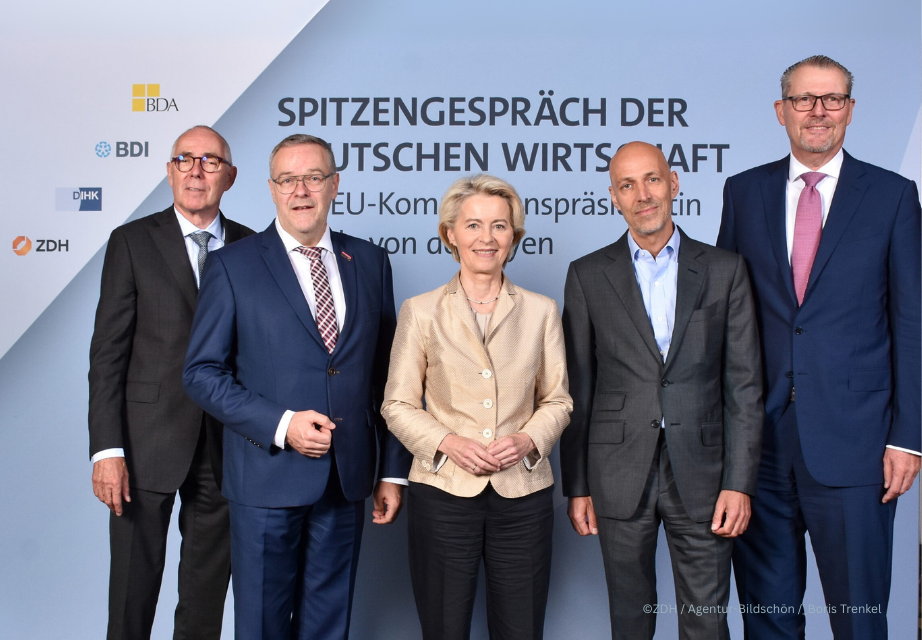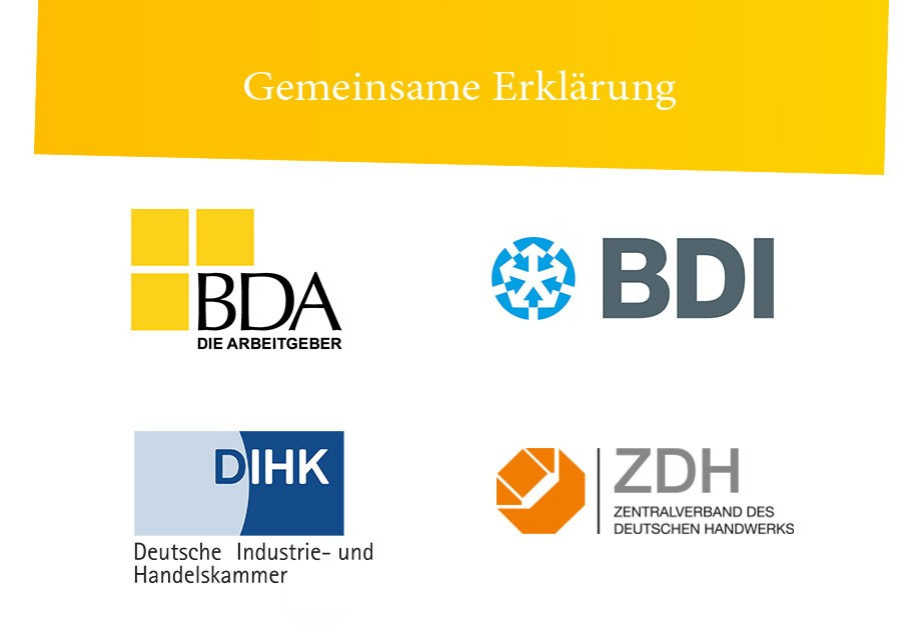- TOPICS
-
-
- Employment and Labour Market
- Labour law and collective bargaining policy
- General applicability
- Industrial action
- Labour & collective bargaining law
- Working time
- Time limit
- Works Constitution
- Bureaucracy reduction
- Data protection
- Protection against discrimination
- Parental leave
- Posting
- Insolvency
- Protection against dismissal
- Minimum wage
- Co-determination
- Mobile work
- Maternity protection
- Pandemic
- Care time
- Self-employment
- Tariff autonomy
- Collective Bargaining Agreement
- Collective bargaining unit
- Tariff policy
- Collective bargaining
- Collective agreement
- Part-time work
- Restructuring
- Holiday law
- Contracts for work
- Whistleblowing
- Temporary work
- Education and vocational training
- Training market
- Professional orientation
- Education policy
- Education 4.0
- Dual education
- dual study
- Permeability
- Early childhood education
- Higher Education Funding
- Lifelong learning
- Teacher Education
- Reorganization of education and training
- STEM Professionals
- Economic education
- Accreditation/Quality assurance
- SCHOOLBUSINESS Germany
- Digitalization and innovation
- Europe and International Affairs
- Social policy and social security
- Old-age poverty
- Work made in Germany
- Occupational safety
- Contribution and registration law
- Company pension scheme
- Shortage of company doctors
- Health insurance
- Long-term care insurance
- Mental health
- Pension insurance
- Riester pension
- Social self-government
- Social insurance
- Accident insurance
- The future of social security
- Taxes & Finances
- Economy & Society
-
-
-
- Newsroom
- The BDA
- Members

Act now: Europe needs a competitiveness agenda

Act now: Europe needs a competitiveness agenda
Joint statement by leading German business associations on the occasion of the summit meeting with European Commission President Ursula von der Leyen on September 18, 2025
Europe is under enormous pressure. High energy prices, a high demand for skilled workers, and unnecessary bureaucracy are slowing down innovation and investment. Geopolitical tensions, intensified global subsidy competition, and growing challenges to the multilateral, rules-based trading system are exacerbating the situation.
The competitiveness of many locations in the European Union is at risk. Europe's role in the world is being called into question. Looking back on the past weeks and months, it must be clear to everyone that An economically weakened Europe is less able to assert its interests and values. Regaining economic strength must therefore be the top priority of European policy.
The four leading associations of German business – BDA, BDI, DIHK, and ZDH – are calling for a decisive competitiveness agenda and support the EU Commission in all measures that serve this goal. The strength of the EU stems primarily from its economic unity and favorable conditions in the single market – and Germany plays a central role in this. A strong Europe needs a strong Germany. Conversely, only if the EU as a whole is successful can the German economy be successful again.
One year after the Draghi report, we can see that his diagnosis was correct. The EU institutions must finally act in an economically sound and pragmatic manner. They must finally follow up their announcements on strengthening Europe's competitiveness with action. Competition will not wait for us. The German federal government must support this course ambitiously and unanimously.
Key demands for a European competitiveness agenda
A forward-looking European economic policy must now focus on five key points:
1. Accelerate the reduction of bureaucracy – strengthen competitiveness
EU legislation must become better and faster – with mandatory impact assessments and competitiveness checks for all economically relevant laws, strict application of the “one in, two out” principle, and the consistent elimination of regulatory duplication and disproportionate burdens. The EU should reduce existing overregulation through further omnibus packages and carry out regular reviews of laws in the long term. Complex regulations and excessive reporting requirements must not paralyze the innovative and investment power of our companies. Ambitious simplifications in environmental law are also necessary to speed up planning and approval procedures.
2. Ensuring affordable and reliable energy
Europe needs rapid grid expansion, technological openness, and fair crediting of international climate protection contributions—only then can energy remain predictable and competitive for companies. The EU's ambitious climate targets require investments on a historic scale. A Clean Industrial Deal must therefore inextricably link climate protection and competitiveness and guarantee that energy remains affordable and reliably available even as demand rises. To enable industry to invest, the EU Emissions Trading System must also be made future-proof quickly. Reliable and effective protection against carbon leakage is crucial.
3. Deepen the single market – facilitate the mobility of skilled workers
The single market is the home market of the German economy and the economic backbone of Europe. It must be deepened quickly and noticeably based on the EU Commission's single market strategy. The focus is on simplifying the free movement of goods and services and removing existing restrictions as far as possible. In addition to the still varying regulations for products and packaging, there is enormous potential, particularly in the area of services and worker mobility. Removing barriers to posting, for example through more and better digitalization and debureaucratization, modern coordination of social security, and faster recognition of professional qualifications would strengthen the internal market and cross-border economic activity in the long term.
4. Opening markets and strengthening resilience
Europe must swiftly conclude new trade agreements and establish stable value chains and supply chains in order to secure its global strength and increase economic resilience. The agreements with Mercosur, India, Australia, Indonesia, and Malaysia must be finalized and ratified quickly. At the same time, supply chains must be diversified to reduce dependence on individual countries. Raw material partnerships must also be expanded in a targeted manner. Strategic cooperation—such as Global Gateway projects—must be designed in such a way that small and medium-sized enterprises in all sectors and regions also benefit. A level playing field is a prerequisite for European companies to be able to compete globally.
5. Relieving the burden on small and medium-sized enterprises – creating practical rules
A strong SME sector is a key prerequisite for a resilient and innovative European economy. However, small and medium-sized enterprises (SMEs) in particular are hampered in their competitiveness and ability to act by excessive bureaucratic burdens. Existing burdens should therefore be consistently reduced – in a practical manner and in a legally secure way. Regulations should be subject to binding impact assessments that take the reality of SMEs seriously. A mandatory SME suitability test must precede any new EU regulation, in accordance with the principle of “think small first.” Small and medium-sized enterprises and small mid-caps in particular suffer from high energy costs, lengthy approval procedures, and confusing reporting requirements. SME policy must once again be given a central place in the European competitiveness agenda.
The leading associations of German industry call on the EU institutions and the German government to act quickly and decisively now – for growth, competitiveness, and a strong future for Europe.






